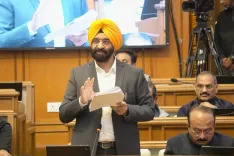Why Have Bangla Dairy Milk Prices Remained Unchanged After GST Cut?

Synopsis
Key Takeaways
- The GST on milk products has been reduced, but prices remain unchanged.
- Bangla Dairy customers are still paying previous rates.
- The GST 2.0 reform simplifies the tax system.
- Consumer spending is vital for the economy, especially during festive seasons.
- Transparency and connection between policy and market prices are essential.
North 24 Parganas, Sep 24 (NationPress) The Central government has implemented a reduction in the Goods and Services Tax (GST) applicable to all milk products as part of its latest tax reform initiative. Nonetheless, the prices for milk products offered by Bangla Dairy in various areas of West Bengal, particularly in North 24 Parganas, have remained stable, with consumers still paying the previous rates. This is despite the fact that dealers are acquiring these products under the new GST structure.
In an interview with IANS, Biplob Majumdar, a Bangla Dairy dealer based in Sodepur, North 24 Parganas, stated: "While we are acquiring goods under the new GST bracket, the benefits have not trickled down to the average consumer. The company has indeed lowered the GST, but the retail prices stay the same. Since we do not impose GST on our sales, the prices remain unchanged. I have not noticed any reductions. The new GST framework has only influenced our purchase prices, not what consumers are charged, especially concerning milk products."
This recent GST overhaul, named “GST 2.0,” officially took effect on September 22 and represents the most significant change in indirect taxation since the introduction of GST in 2017. The earlier four tax slabs (5%, 12%, 18%, and 28%) have now been consolidated into two: 5% and 18%.
The purpose of this reform is to streamline the tax framework and encourage consumer spending. Following the announcement, numerous FMCG companies released revised price lists through distributors, websites, and media campaigns, showcasing reductions in prices for essential items and packaged goods.
These extensive reforms align with Prime Minister Narendra Modi’s larger vision to transform India’s tax structure and enhance household consumption, which constitutes more than half of the nation’s GDP.
The timing of this tax reduction is significant, coinciding with the onset of the festive season, a time when Indian consumers typically boost their spending on a wide range of products, from clothing to electronics.










